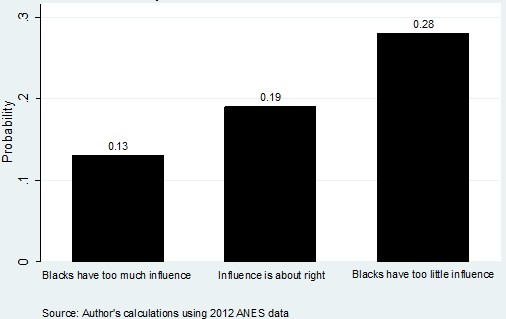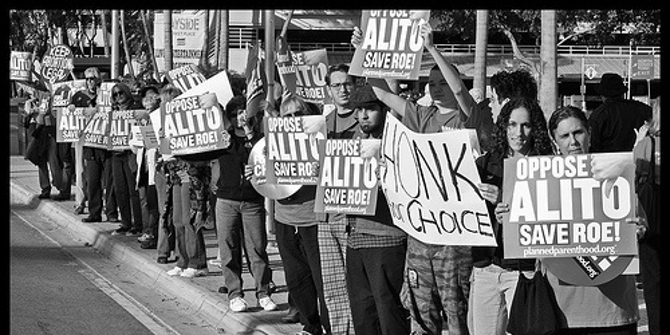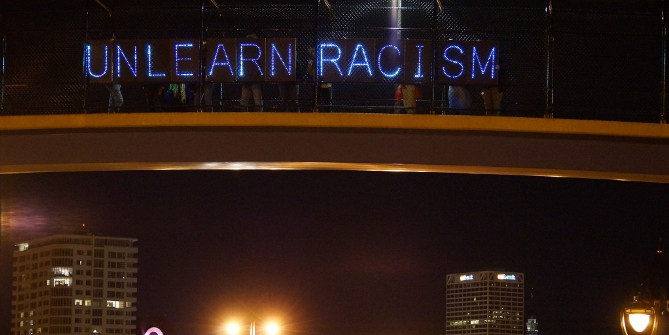
 Donald Trump’s 2016 election victory and subsequent presidential administration have been marked by increasingly harsh rhetoric against immigrants, especially those from Latin America. In new research, Betina Cutaia Wilkinson and Natasha Bingham examine the attitudes of African Americans living in the South towards immigrants. They find that when Southern blacks feel powerless, disadvantaged and sense that their group is being alienated, they are less likely to support greater levels of immigration and more likely to view immigrants as potential rivals.
Donald Trump’s 2016 election victory and subsequent presidential administration have been marked by increasingly harsh rhetoric against immigrants, especially those from Latin America. In new research, Betina Cutaia Wilkinson and Natasha Bingham examine the attitudes of African Americans living in the South towards immigrants. They find that when Southern blacks feel powerless, disadvantaged and sense that their group is being alienated, they are less likely to support greater levels of immigration and more likely to view immigrants as potential rivals.
Throughout his presidential campaign, now-President Donald Trump’s anti-immigration rhetoric gained him a considerable amount of media and political attention. His references to Mexicans as rapists and criminals were criticized heavily by some but applauded by others. Still, immigration is a topic that has guided political debates as far back as the birth of this country because of its continuous relevance to the daily lives of most US residents. Today, focus has been placed on immigration from Latin America since the majority of immigrants arriving to this country are from Mexico.
A US region that has experienced a quick and significant growth in its Latino population is the South. From 2000 to 2010, the Latino population grew significantly in the South with a 57 percent increase in its Latino population—four times the increase in the total population of the South. Figure 1 shows that from 1990 to 2000, the Latino population in six southern states (i.e., Alabama, Arkansas, Georgia, North Carolina, South Carolina, and Tennessee) grew by more than 200 percent. From 2000 to 2010, all six states saw an increase in growth of Latinos (although not as extensive as in the previous decade) by more than 96 percent.
Figure 1 – Growth of the Hispanic Population in the South in 1990, 2000 and 2010

Sources: US Census 1990, 2000, 2010, and Pew Hispanic Center Tabulations from 1990 and 2000 Census Summary File 1
In addition to Latinos, African Americans have established a solid presence in the South; the latest census report stated that the black population has the highest concentration in the South: 105 Southern counties have a black population of 50 percent or higher. Relative to other US regions, the South has a rigid racial hierarchy that generates significant disparities in social, political and economic opportunities between its white and African American residents. Immigrants in the South like Latinos often reside near blacks and work alongside blacks given their comparable socioeconomic status.
It is against this backdrop that our research considers Southern blacks’ dispositions toward immigration and immigrants. While we know that economic self-interest can shape Southern black attitudes toward immigration, we know relatively little about the effects of power and discrimination on their sentiments toward immigrants and immigration. Thus, our research specifically centers on this topic. We argue that what is really at the heart of Southern blacks’ attitudes toward immigration and immigrants is not necessarily their economic self-interest but rather feelings of powerlessness and experiences and perceptions of discrimination. When Southern blacks are powerless, disadvantaged and sense that their group is being alienated, they are less predisposed to favor increased immigration and potential rivals such as immigrants.
Our analyses of 2012 American National Election Study data reveal some support for our theory. We find that believing that they have limited to no political power increases the likelihood that Southern blacks believe that immigrants pose an economic threat. Figure 2 presents a more complete illustration of this finding. Southern blacks who perceive that African Americans have too little political influence are much more likely to believe that immigrants take jobs than those who sense that blacks have too much or an adequate amount of political clout.
Figure 2 – Probability of Southern Blacks’ belief that immigrants take jobs by perceived political influence of Blacks

Our results shed light on the importance that feelings of powerlessness have on African Americans attitudes toward immigrants. While some African American in the South may adopt an anti-immigrant perspective by supporting President Trump’s plan to build a US-Mexico border wall and to curb unauthorized immigration, the reasons for their support of these policies may not be the same as those of other racial groups such as whites. Thus, recognizing the context in which blacks’ opinions of immigrants develop is essential to obtaining a comprehensive understanding of black and Latino immigrant relations today.
This article is based on the paper “Getting Pushed Back Further in Line? Racial Alienation and Southern Black Attitudes toward Immigration and Immigrants” in PS: Political Science and Politics.
“North and South US 1” by Taber Andrew Bain is licensed under CC BY 2.0
Please read our comments policy before commenting.
Note: This article gives the views of the author, and not the position of USAPP – American Politics and Policy, nor of the London School of Economics.
Shortened URL for this post: http://bit.ly/2oJfZGa
_________________________________
 Betina Cutaia Wilkinson – Wake Forest University
Betina Cutaia Wilkinson – Wake Forest University
Betina Cutaia Wilkinson is assistant professor of political science at Wake Forest University. Her latest book project Partners or Rivals? Power and Latino, Black and White Relations in the 21st Century (University of Virginia press, 2015) recently won the American Political Science Association REP Section’s Best Book Award on Inter-Race Relations in the United States.
 Natasha Bingham – Loyola University New Orleans
Natasha Bingham – Loyola University New Orleans
Dr. Natasha Bingham is an Assistant Professor of Political Science at Loyola University New Orleans. Her research interests focus on intersectionality of gender, race, and ethnicity and gender and sexuality in former Soviet republics and US politics.






